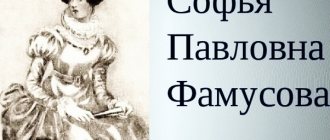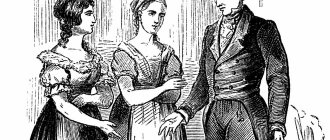In the comedy "Woe from Wit" Griboedov touched upon the main socio-political changes that took place in Russia after World War II. Through the monologues of the main characters, the author tries to find answers to the pressing questions of his time - this is the problem of serfdom, and the human right to freedom of thought, and domestic education and enlightenment, and, of course, careerism and admiration for rank. An analysis of Chatsky’s monologues shows the attitude of the “present century” to what is happening.
Exposition of the play
The idea of “Woe from Wit” is to contrast two eras - “the past century” and “the present century.” The first is characterized by a serf-like way of life, the second by progressive views. Chatsky, being the ideologist of the modern worldview, cannot help but express his attitude towards everything that happens around him. It is for this reason that the analysis of his monologues is of great importance for understanding the concept of the play.
The hero's first monologue begins even before the main plot begins. “Well, is that your father?” - he asks. And then he concerns Moscow morals, which have not changed at all during the years of his absence. He is depressed by the existing system of raising children by foreign tutors; noble children grow up in full confidence that a German or French teacher is the norm. The quality of education leaves much to be desired, but their parents are attracted by the price of services provided by such tutors. Chatsky, in his mocking manner, notes that now “mixing the languages of French with Nizhny Novgorod” is a sign of education .
The attitude of the main character towards everything foreign can be understood if you analyze Chatsky’s monologue about a Frenchman from Bordeaux, in which the hero tells how he was going to our country: “I came to Russia, to the barbarians, with fear and tears - and found that there were no caresses I didn’t meet the end, not a Russian sound, not a Russian face.”
A detailed analysis of Chatsky’s monologue in act 3, scene 22 shows that the Russian people, in pursuit of foreignness, have lost their identity. How can you put your native language, traditions and ancient customs lower than foreign ones?
Plot plot
With the hero's second monologue, the beginning of the conflict begins. According to the plan of the play, Famusov speaks in an impolite manner about Chatsky’s free views and hurts his pride. The young man, having tender feelings for Sophia, tries not to irritate her father, answers him briefly, but is not going to assent. “And exactly, the world began to become stupid...” - this is how he began his speech in a rather calm and ironic tone after Famusov’s moral teachings. This is how the confrontation between two worldviews begins—the current one and the outgoing one.
Trying with pathos to teach Chatsky how to make a career, Famusov constantly refers to the experience of Uncle Maxim Petrovich , considering him a role model. Chatsky categorically disagrees with this approach. He believes that Catherine’s age of “humility and fear” has already passed, giving way to a new history, in which for a successful career it is not necessary to “turn the back of your head”, it is enough to be honest and love your job.
"Famusovs" then and now
Chatsky became a representative of a new trend that changed the usual social foundations. In his opinion, only a person who has certain qualities can occupy responsible positions:
- education;
- conscientiousness;
- honesty.
Unfortunately, his time had not yet come. And during the reign of Empress Catherine II, Maxim Petrovich still turned out to be smart enough to understand when to bend or make fun of his superiors, despite the pain. And at one time this approach yielded results:
- “all in orders”;
- “I ate on silver... I ate on gold”;
- “hears a friendly word at court”;
- He has a hundred servants in his service.
Famusov, following in the footsteps of his moral mentor, also made quite a decent career and is now trying to lead Molchalin along the same path.
His position as a nobleman, a wealthy landowner and father is quite understandable. If time dictates such standards of behavior, then he will adhere to them, especially since they are for the benefit of him and his family. Chatsky, appearing in Moscow after a long absence (Chekhov does not specify where exactly he was), shocks everyone with his advanced ideas. It is not surprising that Famus society perceives him as “crazy.”
The culmination of the confrontation
Everyone has heard Chatsky’s famous monologue “Who are the judges?”, at its core it is an outburst of the hero’s true feelings. The character's anti-serfdom views are revealed, the tone of his narration is radically different from previous monologues. Calmness and irony gave way to passion. Critics subsequently noted that Chatsky’s views were close to the ideas of the Decembrists. The hero’s speech is not unfounded; it is supported by the facts of the terrible attitude of the owners towards their serfs and the lawlessness that was happening:
- One of the “noble scoundrels, surrounded by a crowd of servants... he exchanged three greyhounds for them!!!”
- Another “the debtors did not agree to the deferment... they were all sold out one by one!”
In this speech one can feel sincere pain and resentment for those whom one would like to call “the fathers of the fatherland, whom we should take as models.”
The strong and powerful of this world do not obey the law and the court, having fenced themselves with connections, their position and bribes. Meanwhile, the serfs who fought for the Fatherland in the War of 1812, the real heroes of their homeland, are bought and sold like some kind of commodity . This alone makes one think about the impossibility of the existence of serfdom (half a century will still have to pass before these thoughts are realized).
Griboedov, through his hero, expresses his own thoughts about what is happening. An analysis of Chatsky’s monologue about a Frenchman from Bordeaux, even a short excerpt of it, reveals the character of the hero, who has similar traits to the author himself. Listening to the young man’s passionate speech, you can’t help but think about the need for changes in public consciousness.
The role of monologues in the play “Woe from Wit” (A.S. Griboyedov)
The role of monologues in the play “Woe from Wit” (A.S. Griboyedov) is great both in revealing the image of the main character and in expressing the theme and idea of the work, and the position of the author. In addition, each monologue participates in the compositional structure of the play.
Griboedov is an innovator of his time, and “Woe from Wit” is a truly revolutionary play that caused literary critics to argue heatedly for many years. And even today, not all questions have clear answers. And all because the problems that the author identifies in the work are completely ambiguous. And although “Woe from Wit” was written in the post-war time of reforms and fresh views on life, the new still raised many questions and doubts, and the old cannot simply be crossed out and abandoned.
In Chatsky’s monologues, Griboedov most fully put into play his idea of the contradiction of a person of a new formation, with fresh views on life in an inert society.
So, the exposition of the play can be considered Chatsky’s monologue “What’s your father? all the English club..." It precedes the main conflict of the work, but already in it there is a harsh satire on outdated social foundations. But so far there is no criticism and confrontation in it, which will be unleashed in subsequent monologues.
But the clash of Famusov’s monologues “That’s it, you are all proud!” and Chatsky “And exactly, the world began to grow stupid...” can be considered the beginning of the conflict of the play. They also contain a direct confrontation between the present century and the past century. Chatsky openly calls vices what was considered a virtue in Famusov’s society and what, in the opinion of the old people, the youth of today should strive for. You need to “step up” and “bend” if you want to go far. Famusov notes the excessive obstinacy of young people and the reluctance to adopt the experience of their fathers.
But Chatsky mercilessly denounces servility, obedience and fear. He condemns sycophants and liars, contrasting them with the “present century” and modern people who do not want to grovel before the sovereign. In the first monologue, Chatsky’s idea is that one must achieve everything according to honor and conscience, that today there is no place in society for flatterers. For him there is no lesson in how his fathers and grandfathers lived. The main character is convinced that the world needs to be changed, “to serve the cause, not individuals.”
In addition to the main one, there is also a love conflict in the play. And the main character, realizing that the former and once strong feeling between him and Sophia has faded, does not miss the opportunity to speak about love in the monologue “Let’s leave these arguments...”. He doubts that Molchalin will be able to love Sophia so much that the feeling can eclipse everything around. For the main character, everything is vanity and dust without love. The feeling should be with passion, with fire:
But does he have that passion? that feeling?
that ardor?
So that he has the whole world besides you
Did it seem like dust and vanity?
What does this monologue tell us? From it we learn that before us is not just an active, ambitious young man, but also someone who can truly feel. It is full of life and passion. His passionate nature prevents him from avoiding sharp corners in a conversation and forces him to directly cut down the truth as it is.
The culmination of the comedy and the revelation of the protagonist’s character is one of his most famous monologues, “Who are the judges?” With contempt, Chatsky casts judgment on the older generation, from whom he should learn. He is against the elders who always criticize progressive youth, drawing knowledge from “yesterday’s newspapers”:
“Where, show us, are the fathers of the fatherland,
Which ones should we take as models?
A person should move forward, and not freeze in time. And the age of “noble scoundrels” who were ready to easily exchange loyal serfs for hunting dogs has passed. He hates inequality and the eternal desire for profit. In this monologue, the ideas of the Decembrists that everyone should serve the people, and not themselves, sound especially loud. And with bitterness he admits that new ideas are unpalatable to society, and people like Chatsky become outcasts and are considered crazy. They will not be heard, because no one wants to lose their acquired wealth. Therefore, he is not allowed to finish, once again reminding him that he has no place in Famus society.
Each monologue of Chatsky is dedicated to a specific problem. As an observant person, he could not help but notice one Frenchman at a reception in Famusov’s house. A very mediocre foreigner attracted all the attention of the female society. In the monologue “There is an insignificant meeting in that room...” Chatsky exposes another vice - blind imitation of everything foreign. No, he is not against learning from Europe, but only the things that are really necessary. Thoughtless admiration for the European deprived the Russian person of self-esteem. Chatsky is trying to open the eyes of those who already consider him crazy, so his words have absolutely no effect on society.
The denouement of two conflicts at once is Chatsky’s final monologue “I won’t come to my senses... I’m guilty...”. Sophia’s secret is revealed and the main character is disgusted to think that the one whom he once considered the only living soul in this house has chosen a “husband-boy”, “husband-servant”. He is disgusted by the very thought of who he was exchanged for and that Sophia succumbed to her father’s influence. Everything in this house disgusted him to such an extent that he could no longer be here for a minute. Chatsky compares Famusov, who visited the house, with someone who came out of the fire:
You are right: he will come out of the fire unharmed,
Who will have time to spend a day with you...
I don’t want to consider Chatsky defeated, despite the fact that his ideas failed in Famusov’s house. But he left with pride, true to his ideas. And yet the composition of the play suggests the opposite. And this is precisely what makes us think even today: is Chatsky right? If even Griboyedov, expressing his thoughts in the words of the main character, drives him out of the play? Even if with his last word, he still points him to the door. Or maybe the whole point is that the Chatskys’ time has not yet come and they should “grow up” a little and understand that, although their ideas are fresh and honest, they still shouldn’t renounce the experience of their fathers and grandfathers?
Disputes about the play “Woe from Wit” continue. But it is precisely in this ambiguity that Griboyedov’s genius lies. And his immortal work is relevant at all times. After all, the conflict between the “present century” and the “past century,” fathers and sons, is an inexhaustible topic for thought. And how good it would be if fathers stopped reproaching their sons, and sons began to listen to their fathers and take the best from their experience. But while some consider others crazy, others in an impulse throw the immortal: “A carriage for me, a carriage!”
Resolution of the conflict
At the very beginning of the play, the hero still hoped for a positive outcome. Sophia’s opinion is very important to him, which is why he was so upset and amazed at the ridiculous rumors about himself. He exclaimed bitterly: “Did I hear with my ears! not laughter, but clearly anger. Everyone repeats the absurdity about me out loud!”
With his last monologue, Chatsky makes it clear that he will not be able to come to terms with reality as long as people like Famusov rule. He is no longer surprised by the lack of understanding of society, which is afraid of change. He even agrees that he was declared insane, since it is impossible to maintain sanity for those who:
- “I’ll have time to spend a day with you”;
- “he will breathe the air alone, and his mind will survive.”
He leaves Famusov’s once-native home, but the derogatory attitude did not change him and did not defeat him; Chatsky, as before, is true to himself and his ideals.
If you make a table of the location of Chatsky’s monologues in the play and their meaning, then you can see the relationship with the turning points in the development of the storyline. All the monologues of the main character are important not only from the plot point of view, they form the semantic structure of the play, raising relevant topics not only of that time, but also of the present time.


